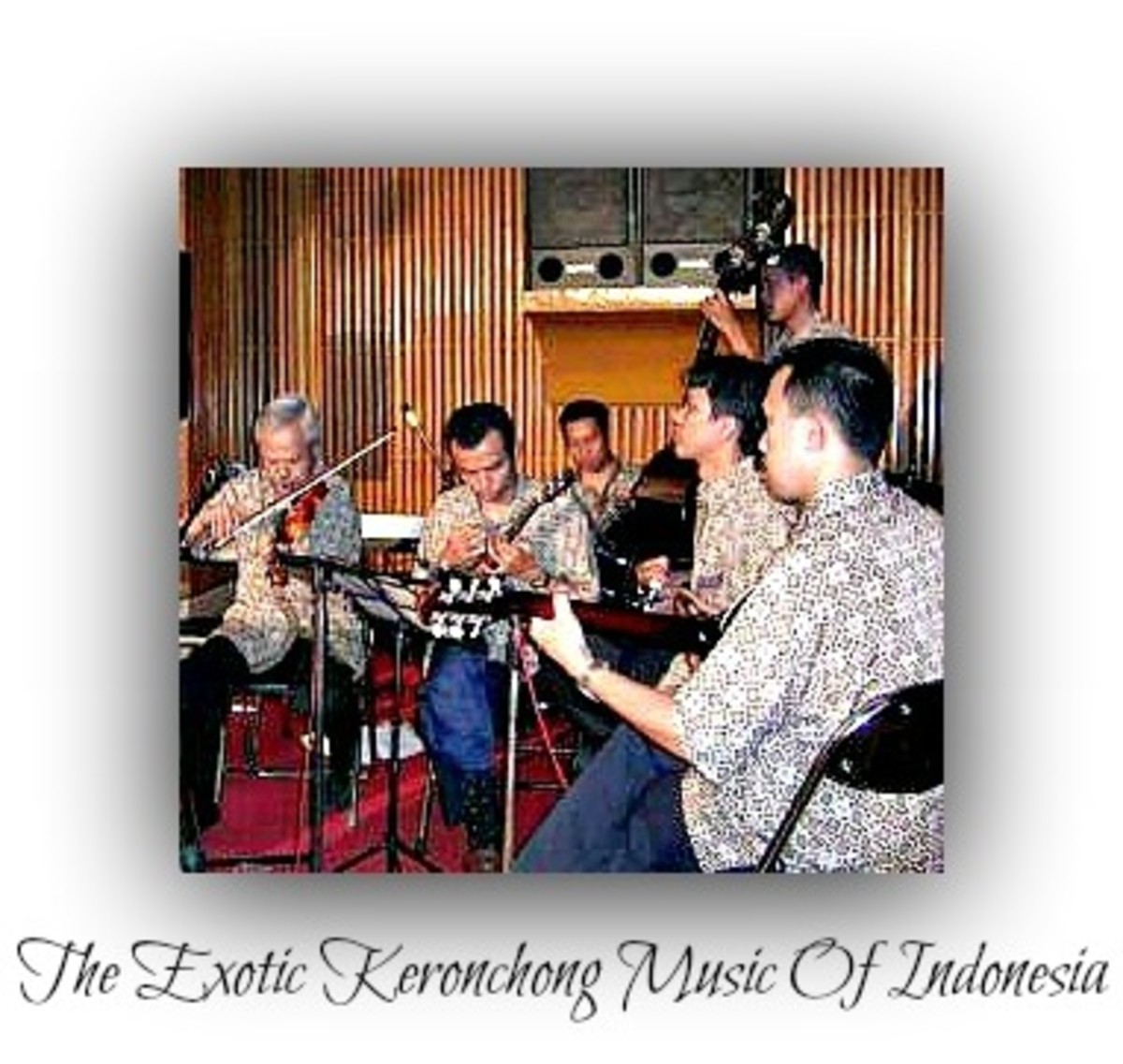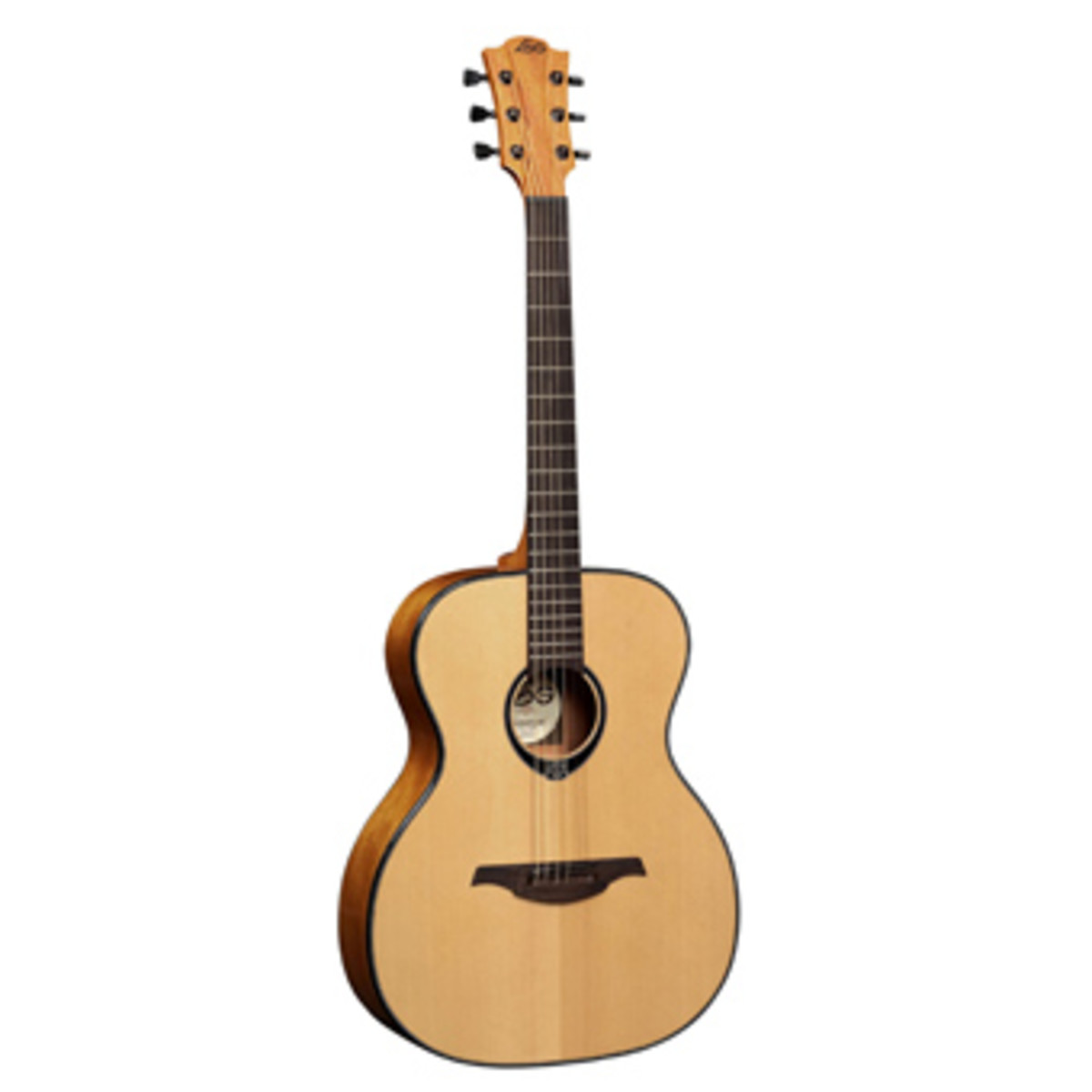MUSIC and SONG = WORSHIP and PRAISE (Part 2) Singing as Used in Religious Practice

"Make a JOYFUL NOISE unto the LORD, all ye lands. Serve the LORD with GLADNESS: come before his presence with SINGING."
Again, this scripture verse (Psalm 100:1-2 KJV) always comes to mind when the topic and question is raised about:
"What are the most appropriate types of music and songs that should be used in our gatherings for worship and praise (and of course - What instruments should also be used or not used?)."
To restate the fact that "NOISE" doesn't necessarily sound like music per se, but it is at least being "JOYFULLY" directed towards the Lord God. It is also being asked of ALL THE LANDS to observe, not just a specific sect of the church or group of people. And to "SERVE" the Lord with "GLADNESS and SINGING". The meaning behind this statement reflects that the manner in which our worship and praise are being observed is the main thing to emphasize.
In the answer to the question, scripture does not necessarily reflect WHAT INSTRUMENTS should be used and considered appropriate or WHAT KIND OF MUSIC should be played, but more importantly HOW THEY ARE BEING USED to glorify and edify our Lord God in Heaven!
Musical Instruments Used in the Holy Bible
Let us recap then from the first written segment in this series of articles which predominantly focuses on the musical instruments used in praise and worship:
http://hubpages.com/hub/MUSIC-and-SONG-WORSHIP-and-PRAISE
"Since scripture DOES NOT clearly identify that certain instruments or forms of music should not be used, then ALL instruments and TYPES OF MUSIC could be applicable solely based on their precise use, with the intent and extent of worship and praise that they offer."
Likewise, since musical instruments may be used as an accompaniment to singing, their use in worship and praise them becomes equally as valuable. The main criteria seems to reinforce the fact that worship and praise should simply be derived and filled with the Holy Spirit. It should likewise in all forms honor and glorify our Lord God, in ways which serve Him with both magnitude and respect. So as far as what forms of music and song are most appropriate...
But there were also false prophets among the people, just as there will be false teachers among you. They will secretly introduce destructive heresies, even denying the sovereign Lord who bought them - bringing swift destruction on themselves. Many will follow their depraved conduct and will bring the way of truth into disrepute. In their greed these teachers will exploit you with fabricated stories. Their condemnation has long been hanging over them, and their destruction has not been sleeping. (2 Peter 2:1-3 NIV)
The above verse can just as easily be used to argue both sides of this topic. The reason I have referred to it is actually quite simple... I firmly believe what I have read in scripture is factual. I feel convicted by the Spirit on the necessity to recount these things for others to speculate and possibly learn from.
The "Word of God" (scripture) teaches us to be mindful of false teachings and wary of incorrect leadership. It gives us all the evidence necessary to correctly observe these things and the Holy Spirit embodies us with discernment, wisdom, and convicts us when we are doing the wrong things or are witness to the same. Let scripture speak accordingly, as the Holy Bible and the living "Word of God" answers its own questions and provides confirmation unto itself. The truth then becomes evident to us through prayerful consideration and spiritual revelation.
--------------------------------------------------------------------------------------------------------------------------------
-------------------------------------------------------------------------------------------------------
The ORIGINS of WORSHIP and PRAISE
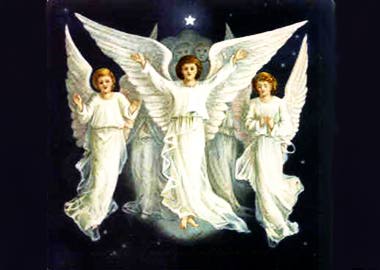
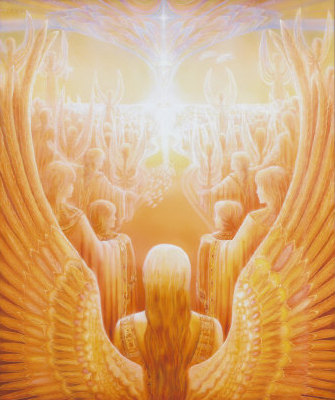
SINGING (VOCALS)
The original instrument and music used to glorify the Lord God was of course the VOICE. In the beginning, there was the WORD, which God used to speak all creation into existence. Ever since then, "Words" (Voice) have been used to offer Him worship and praise through song and to glorify God for that creation with singing.
On what were its footings set, or who laid its cornerstone - while the morning stars sang together and all the angels shouted for joy? (Job 38:6-7 NIV)
Every description ever made of Heaven depicts choirs of Angels surrounding the Throne of God, which continuosly sing, play music, and glorify the Lord God.
"...I saw also the LORD sitting upon a throne, high and lifted up, and his train filled the temple. Above it stood the seraphims: each one had six wings; with twain he covered his face, and with twain he covered his feet, and with twain he did fly. And one cried unto another, and said, Holy, holy, holy, is the LORD of hosts: the whole earth is full of his glory."
(Isaiah 6:1-3 KJV)
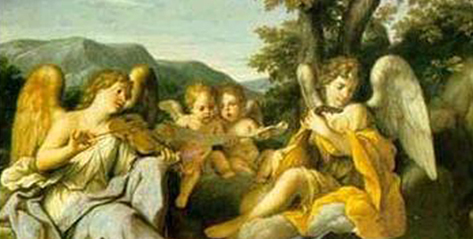
Every musical instrument that exists had already been conceived and created by our Lord God, even before mankind had uttered his first words (or sung his first songs of praise).
You were in Eden, the garden of God; Every precious stone was your covering: The sardius, topaz, and diamond, beryl, onyx, and jasper, sapphire, turquoise, and emerald with gold. The workmanship of your timbrels and pipes was prepared for you on the day you were created. (Ezekiel 28:13 NKJV)
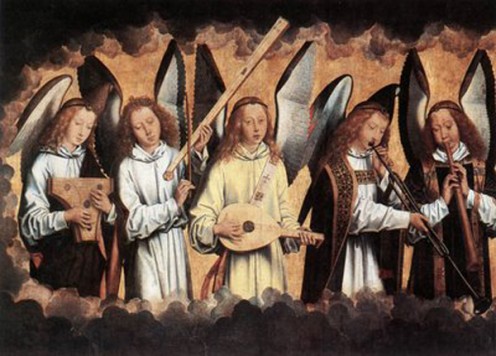
So music has therefore been established as the primary means to worship and praise God.
You alone are the LORD; You have made heaven, the heaven of heavens, with all their host, the earth and everything on it, the seas and all that is in them, and You preserve them all. The host of heaven worships You. (Nehemiah 9:6 NKJV)
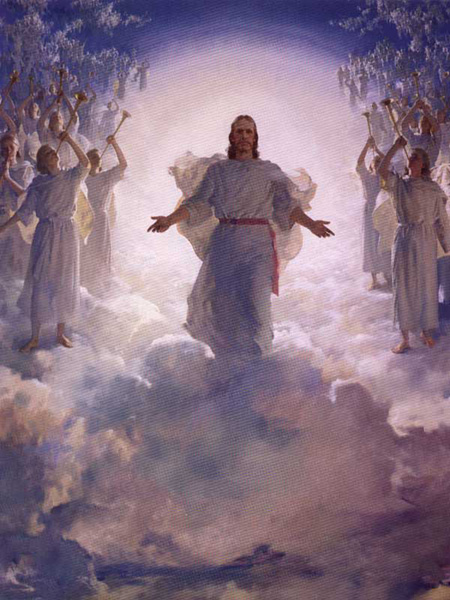
The LORD has established his throne in heaven, and his kingdom rules over all. Praise the LORD, you his angels, you mighty ones who do his bidding, who obey his word. Praise the LORD, all his heavenly hosts, you his servants who do his will.
(Psalm 103:19-21 NIV)
Praise the LORD. Praise the LORD from the heavens; praise him in the heights above. Praise him, all his angels; praise him, all his heavenly hosts. Praise him, sun and moon; praise him, all you shining stars.
(Psalm 148:1-3 NKJV)
It is likewise the duty of ALL people to offer their worship and praise to the Lord our God. He is the creator of all things to which we owe everything to. He has cared for us since the beginning of time and has offered to us a free gift of salvation through His son Jesus Christ, by which we may all be with Him throughout an infinite eternity. That is the best reason why we should be thankful to Him, that in spite of ourselves, He is still willing to love us and forgive our sins.
Let everything that has breath praise the LORD. (Psalm 150:6 NKJV)
PSALMS = Songs
The following Psalm also nicely reflects the changes in worship and praise that has evolved over the centuries in the way we observe these practices.
Praise to God for His Salvation and Judgment (Psalm 149)
Praise the LORD! Sing to the LORD a new song, And His praise in the assembly of saints. (Psalm 149:1 NKJV)
This part of the Psalm is reflecting a call for a "NEW SONG" to be used in the assembly (churches and temples) of the Lord's congregations. Therefore, the invention and writing of newer forms of music and praise is encouraged!
Let Israel rejoice in their Maker; Let the children of Zion be joyful in their King.
Let them praise His name with the dance; Let them sing praises to Him with the timbrel and harp. For the LORD takes pleasure in His people; He will beautify the humble with salvation. (Psalm 149:2-4 NKJV)
The emphasis again is that it is the intention and use of the music that is MORE IMPORTANT than what instruments, songs or types of music are being used. The Lord takes pleasure in His people dancing, playing music, and singing, to honor and glorify Him regardless!
Let the saints be joyful in glory; Let them sing aloud on their beds. Let the high praises of God be in their mouth... (Psalm 149:5-6 NKJV)
Here likewise is reflected a high degree of enthusiasm in worship and praise to the Lord God, not only in the churches and temples but at home (and every aspect of our lives) as well. This Psalm is only one good example yet scripture is filled with many such similar references. I can only imagine how the original followers of the Lord would have taken advantage of these innovative approaches to worship and praise with what is available to them today in our world.
HEBREW Origins of SONG and MUSIC in WORSHIP
Then Moses and the Israelites sang this song to the LORD: "I will sing to the LORD, for he is highly exalted. Both horse and driver he has hurled into the sea. The LORD is my strength and my defense; he has become my salvation. He is my God, and I will praise him, my father’s God, and I will exalt him. The LORD is a warrior; the LORD is his name." (Exodus 15:1-3 NIV)
The Song of Moses and Miriam
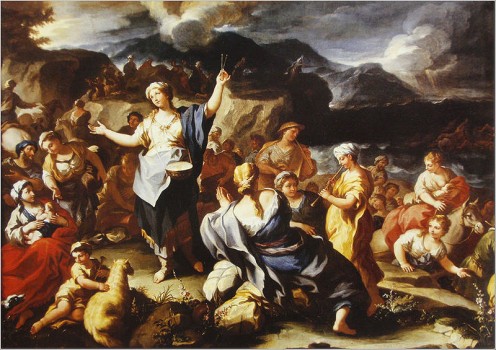
When Pharaoh’s horses, chariots and horsemen went into the sea, the LORD brought the waters of the sea back over them, but the Israelites walked through the sea on dry ground. Then Miriam the prophet, Aaron’s sister, took a timbrel in her hand, and all the women followed her, with timbrels and dancing. Miriam sang to them: “Sing to the LORD, for he is highly exalted. Both horse and driver he has hurled into the sea.”
(Exodus 15:19-21 NIV)
According to music historian Abraham Schwadron, "probably the most important musical contribution of the ancient Hebrews was the elevation of the status of liturgical music in union with ritual ceremonies." He notes the "high degree of musico-liturgical organization" from the descriptive accounts of King Solomon's Temple, such as the 24 choral groups consisting of 288 musicians which took part in 21 weekly services.
Despite the similar instruments used by the Hebrews which were also used in neighboring cultures, including Phoenicia, Egypt, Assyria, and Greece, Schwadron writes that "it would be accurate to state that... it is in the particular uses of music - sacred and secular, ethical and aesthetical - that ancient Jewish music made a unique contribution."
Music historian John Stainer also notes that the earlier relationship between Abraham and the Canaanites "in all probability influenced future Hebrew music," and which probably caused Abraham to carry a certain amount of Assyrian music or musical instruments into Egypt. He adds that a stay of four centuries "in so civilized a culture as Egypt must have largely added to their knowledge of the art."
The POWER of WORSHIP and PRAISE
The Lord taught the Hebrew people how to worship and praise Him for many reasons. One of these reasons being that proper obedience and observance of these practices called upon the manifestations of God and His Heavenly Hosts. Worship and praise will take normal circumstances into the realm of the Holy Spirit and the supernatural. God then enables the Host of the Heavens to deliver salvation to the faithful.
Here is but one of the many examples from the Old Testament (2 Chronicles 20:17-22):
"You will not need to fight in this battle. Position yourselves, stand still and see the salvation of the LORD, who is with you, O Judah and Jerusalem! Do not fear or be dismayed; tomorrow go out against them, for the LORD is with you.” And Jehoshaphat bowed his head with his face to the ground, and all Judah and the inhabitants of Jerusalem bowed before the LORD, worshiping the LORD. Then the Levites of the children of the Kohathites and of the children of the Korahites stood up to praise the LORD God of Israel with voices loud and high.
So they rose early in the morning and went out into the Wilderness of Tekoa; and as they went out, Jehoshaphat stood and said, “Hear me, O Judah and you inhabitants of Jerusalem: Believe in the LORD your God, and you shall be established; believe His prophets, and you shall prosper.” And when he had consulted with the people, he appointed those who should sing to the LORD, and who should praise the beauty of holiness, as they went out before the army and were saying: "Praise the LORD, For His mercy endures forever."
Now when they began to sing and to praise, the LORD set ambushes against the people of Ammon, Moab, and Mount Seir, who had come against Judah; and they were defeated.
Obedience and reverance used together with worship and praise will pave the way for the miraculous to occur. This is even evident in the New Testament, for example in the Acts of the Apostles when Paul and Silas had been imprisoned in Philippi of Macedonia:
About midnight Paul and Silas were praying and singing hymns to God, and the other prisoners were listening to them. Suddenly there was such a violent earthquake that the foundations of the prison were shaken. At once all the prison doors flew open, and everyone’s chains came loose. The jailer woke up, and when he saw the prison doors open, he drew his sword and was about to kill himself because he thought the prisoners had escaped. But Paul shouted, “Don’t harm yourself! We are all here!” The jailer called for lights, rushed in and fell trembling before Paul and Silas. He then brought them out and asked, “Sirs, what must I do to be saved?” They replied, “Believe in the Lord Jesus, and you will be saved - you and your household.” (Acts 16:25-31 NIV)
The value of worship and praise are shown throughout the Word of God, whereas He is greatly pleased when we acknowledge Him, are obedient to His Word, offer thanksgiving for His loving grace, and offer our admiration and exhaultation to the Lord most high showing our grateful homage through song and music.
Traditional JEWISH MUSIC
The musical traditions of the Temple were rudely broken by the destruction of the First Temple and the exile of the Jews into Babylon during the 6th century BC. Hindley notes that most of the psalms seem to have been written in the years after the return of the Jews to Jerusalem. Also at this time, the practice of antiphonal ("responsory") singing between the cantor and the congregation seems to have become common, which later migrated into the practice of Christian churches with their hymns.
The music of ancient Israel represents almost fourteen centuries of change, roughly from 1300 BC to 70 AD, when Titus's siege of Jerusalem took place. However, after the fall of the First Temple, the Rabbis took pains to eradicate both the temple music's choral and instrumental traditions. "Their time had arrived, and their ideas on liturgy and music were radically different from those of the Temple priests." It is paradoxical and ironic that modern rabbis continue to praise the instrumental music of the Temple but prohibit any and all instrumental music in their synagogues today.
The music of the Yemenite Jews is noted as being particularly influential in the development of Jewish cultural music because it was seen by early Zionists as a link to their biblical roots. The music of the ancient Hebrews, wrote the musicologist A.Z. Idelsohn, "is preserved in memory and practice in various Jewish centers such as Yemen, in South Arabia, a community that lived practically in seclusion for over thirteen hundred years..."
Traditional Jewish music comprised of prayers, stories and chants, sung together with drums or clapping. These songs for example, are used before the ceremony of "havdalah", a religious ceremony that marks the symbolic end of Shabbat or holidays, and ushers in the new week.
Yemenite Jewish Music
Traditional CHRISTIAN HYMNS
Early Christians have sung "psalms, hymns and spiritual songs", both in private devotions and in corporate worship since the times when the Apostles were establishing the early church..
When they had sung a hymn, they went out to the Mount of Olives. (Matthew 26:30 NIV)
It is the purpose of worship and praise to not only glorify God but to also to build-up and strengthen the church.
What then shall we say, brothers and sisters? When you come together, each of you has a hymn, or a word of instruction, a revelation, a tongue or an interpretation. Everything must be done so that the church may be built up. (1 Corinthians 14:26 NIV)
A hymn is a type of song, usually religious, specifically written for the purpose of praise, adoration or prayer, and typically addressed to God or His personification. The word hymn derives from the Greek word "hymnos", which means "a song of praise." Collections of hymns are known as hymnals or hymnbooks. The Psalms of the Old Testament are of course considered the first hymns and as Christianity evolved, hymns were modeled using poetic passages (commonly referred to as "canticles") taken from the scriptures.
In ancient and medieval times, stringed instruments such as the harp, lyre and lute were used with psalms and hymns. Since there is a lack of musical notation in the earlier writings, the actual musical forms used in the early church can only be speculated on.
Christian hymns have also often been written with special or seasonal themes and these are used on holy days such as Christmas and Easter as well as during particular seasons such as Advent and Lent.
During the Middle Ages a rich melodic style of hymn developed in the form of Gregorian chant or "plainsong" (monophonic music and chants used in the liturgies). This type of hymn was sung in unison and most often performed by monastic choirs. While these hymns were written originally in Latin, many have been translated. A familiar example is the 4th century "Of the Father's Heart Begotten" sung to the 11th century plainsong "Divinum Mysterium".
*Dedicated for Brother Dave and his love for the Lord as well as the choir!
"Of The Father's Love Begotten" sung to "Divinum Mysterium"
PRACTICES to be OBSERVED in WORSHIP and PRAISE
Intelligibility in Worship
Now, brothers and sisters, if I come to you and speak in tongues, what good will I be to you, unless I bring you some revelation or knowledge or prophecy or word of instruction? Even in the case of lifeless things that make sounds, such as the pipe or harp, how will anyone know what tune is being played unless there is a distinction in the notes? (1 Corinthians 14:6-7 NIV)
So it is with you. Since you are eager for gifts of the Spirit, try to excel in those that build up the church. (1 Corinthians 14:12 NIV)
So what shall I do? I will pray with my spirit, but I will also pray with my understanding; I will sing with my spirit, but I will also sing with my understanding. Otherwise when you are praising God in the Spirit, how can someone else, who is now put in the position of an inquirer, say “Amen” to your thanksgiving, since they do not know what you are saying? You are giving thanks well enough, but no one else is edified. (1 Corinthians 14:15-17 NIV)
But in the church I would rather speak five intelligible words to instruct others than ten thousand words in a tongue. (1 Corinthians 14:19 NIV)
To reflect on what is the most appropriate way to WORSHIP and PRAISE the Lord:
As stated before, since scripture DOES NOT clearly identify that certain types of instruments or forms of music should not be used, then ALL instruments and types of music are acceptable solely based on their use and value in worshiping and praising the Lord our God. There is no instrument that anyone can play that was not first designed by God Himself. If the Lord has raised up a person with the talent to play a specific instrument or learn a certain type of music, He did not do so for them to be silenced, but for them to use their God-given gift and praise Him as their creator.
-------------------------------------------------------------------------------------------------------
WORSHIP and PRAISE - The Most Important Aspects of Our Realtionship with the LORD GOD! - (Read our Full 3-PART Article Series)
- MUSIC and SONG = WORSHIP and PRAISE (Part 1) Musical Instruments in Scripture
What are the most appropriate types of music and songs that should be used in our gatherings for worship and praise (and of course - What instruments should also be used or not used?). What musical instruments are found and used in scripture? - MUSIC and SONG = WORSHIP and PRAISE (Part 2) Singing as Used in Religious Practice
(CURRENT ARTICLE) - MUSIC and SONG = WORSHIP and PRAISE (Part 3) Modern Music & Songs in Religion
We live in a more modern era where new inventions and innovations have given us a much larger variety of devices and mediums that we can use to worship and praise God. This allows us more possibilities in the ways that we can glorify the Lord God.
--------------------------------------------------------------------------------------------------------------------------------
Classic Hymns - Christian Songs
Music from the Ancient Holy Land
Other useful HubPages "Well Worth Reading" on this Topic:
- What is Praise? - by drpastorcarlotta
WELCOME to Pastor Dr. Carlotta's Counseling Center One of my favorite subjects I taught at Faith Bible College was P R A I S E L I F E ! ! Being a Worship Leader, it is so important to know how to silence... - The Power of Ancient Hebrew Worship - by Rev Lady
If you want to experience worship as the ancient Israelites did, then you must go to the Psalms for it is there where we meet the Hebrew children in sacred worship. - King David of the Bible - A Man After God's Own Heart - by lctodd1947
My thoughts go to King David and Psalms. The Hebrew name of Psalms is Tehillim, which signifies Praise. This portion of the Jewish Scriptures was the liturgical hymn-book that had been regularly used in... - Praise and Worship or Hymns - by Carl Knittel
Gowing up I attended a very strict church. The music leader used only hymns for group worship and specials were often given a great deal of scrutiny. The Piano, Organ and occasional acoustic guitar were... - Jesus, Should We Praise and Worship Him? If Yes, Then How? - by Elijah Returns
Sometimes, as an over-reaction to the Trinity doctrine, Unitarians can fail to pay Jesus the attention and honour that are rightfully his. So how do we maintain a balanced perspective regarding the honouring...
--------------------------------------------------------------------------------------------
You too can express yourself, your opinions and what "gems of knowledge" that you wish to share with others...
Relate something interesting, earn rewards and attract more readers by writing what's on your mind at Hubpages [ CLICK HERE ].
--------------------------------------------------------------------------------------------
-------------------------------------------------------------------------------------------------------


Building for the glory of Christ's coming Kingdom!
Here on the HubPages® of The Faith Network, we arlaying down the framework for an extended internet-based Ministry and outreach. More content will be added on a regular basis... We invite you to check back often and see what is new.
The FAITH NETWORK provides and promotes practical Biblical teaching, dedicated devotional topics, relevant faith-based resources, and powerful spiritual insights on matters of faith and everday moral living practices for individuals, churches, charitable organizations, Christ-based businesses, and other ministry related efforts.
While you are browsing, see how other Christian HubPages® Authors are writing useful information and creating successful Hub websites. Also check out the official Hub Page Community on Christianity-The Bible and Jesus.
Pastor's Blog - http://www.ForeverinChrist.org
Ministry Site - http://www.Christ4Ever.org
More information about us here on HubPages: http://hubpages.com/hub/Forever-in-Christ
God bless and see you all soon!




